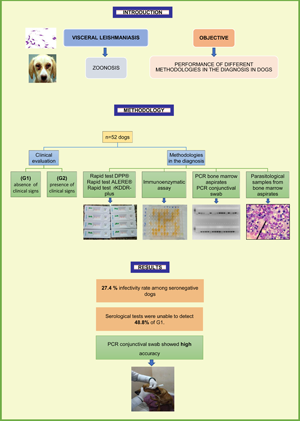Article contents
Visceral leishmaniasis in a recent transmission region: 27.4% infectivity rate among seronegative dogs
Published online by Cambridge University Press: 26 January 2022
Abstract

American visceral leishmaniasis (VL) is a parasitic disease whose main domestic reservoir in the urban environment is dog and is considered one of the most important zoonoses in the context of public health. Serological tests are typically used for the diagnostic screening of the disease. This study aimed to analyse the performance of different methodologies used in the diagnosis of VL in dogs sampled from a recent transmission area. The sample consisted of 52 dogs separated into groups based on the absence and presence of clinical signs of VL. The following serological techniques were carried out: the DPP® rapid test (RT), the ALERE® RT and an RT and immunoenzymatic assay with a recently developed protein (rKDDR-plus). In addition, molecular techniques were carried out with conjunctival swabs, and bone marrow aspirate samples and parasitological samples were obtained directly from bone marrow aspirates. It was concluded that 27.4% of seronegative dogs were infected, but the serological tests, used as screening tests, showed unsatisfactory sensitivity results (average: 51.2%) for dogs without clinical signs. It was suggested that polymerase chain reaction with conjunctival swabbing be used as a screening test for dogs without clinical signs, as this is a non-invasive collection technique with high-sensitivity values.
- Type
- Research Article
- Information
- Copyright
- Copyright © The Author(s), 2022. Published by Cambridge University Press
References
- 2
- Cited by


